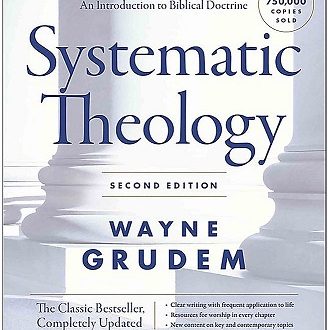One of my favorite quotes from the great reformer Martin Luther is this one:
“If I profess with the loudest voice and clearest exposition every portion of the Word of God except precisely that little point which the world and the devil are at that moment attacking, I am not confessing Christ, however boldly I may be professing Him. Where the battle rages there the loyalty of the soldier is proved; and to be steady on all the battle front besides, is mere flight and disgrace if he flinches at that point.”
It’s a powerful, provocative word, and I have used it I don’t know how many times in speeches and sermons. I picked it up somewhere along the way and have found it to be very effective. Recently, I decided to include it in my forthcoming editorial for JBMW. Since my use of it is to be published, I decided to track down the original source of the saying.
One problem. I searched high and low for the original source, but I could not find it anywhere. I looked through other authors’ use of the quote, but both popular and scholarly writers provided little guidance. Most writers quote other writers’ use of the term. The few that credit an original source cite a letter published in the Weimar edition of Luther’s works [D. Martin Luther’s Werke : kritische Gesamtausgabe (Weimarer Ausgabe) : [3. Band] Briefwechsel, ed. (Weimar: H. Böhlaus Nachfolger, 1933), 81-82]. Here’s a scan of the relevant text from the Weimar edition:

Here’s a rough translation:
“Also it does not help that one of you would say: ‘I will gladly confess Christ and His Word on every detail, except that I may keep silent about one or two things which my tyrants may not tolerate, such as the form of the Sacraments and the like.’ For whoever denies Christ in one detail or word has denied the same Christ in that one detail who was denied in all the details, since there is only one Christ in all His words, taken together or individually.”
As you can see, this does not match the first quotation, though the sentiments described in the former are similar to the latter. Nevertheless, many use the former quote and wrongly attribute it to this letter (e.g., George Lindbeck, Douglas John Hall).
I’m no Luther scholar, so if anyone out there can authenticate the saying I am all ears. Until then, I am going to classify this one as belonging to the apocryphal Luther.




28 Comments
Collin
I like the second quote better anyway.
Pingback:
Michael DeBusk
Looks like the original quotation comes from the Chronicles of the Scoenberg-Cotta Family. The book is a nineteenth century work of historical fiction originally serialized in magazines and then published two years later in 1864. It contains the imagined accounts of two of Luther’s contemporaries. The quotation can be accessed here in its context:
http://books.google.com/books?id=8eCJ9NA4oXAC&pg=PA276&dq=except+precisely+that+little+point+which+the+world+and+the+devil+are+at+that+moment+attacking,&client=firefox-a#v=onepage&q=except%20precisely%20that%20little%20point%20which%20the%20world%20and%20the%20devil%20are%20at%20that%20moment%20attacking%2C&f=false
Information about the book can be found here:
http://books.google.com/books?hl=en&lr=&id=50ix04cQ1fgC&oi=fnd&pg=PA275&dq=chronicles+of+the+schoenberg+cotta+family&ots=oWVB4uj24H&sig=5zotg4i5DYn7YLSlmQOhHwdtVAQ#v=onepage&q=&f=false
Denny Burk
I saw “The Chronicles of Scoenberg” when I was researching last week, and in it not even a fictionalized “Luther” uses the words attributed to him. It may be that the quotation originated here, but that still remains to be seen. I found this to be another dead-end.
Michael DeBusk
It seems likely the quotation originated there given the exact wording. In my mind, the fact that the quotation is not attributed to Luther helps make this case. IOW, why would Charles’ quote Luther verbatim and then put his words in the mouth of his fictional contemporary?
How that quotation then became attributed to Luther, as you mentioned, remains another matter. The book, however, was apparently quite popular, so that might be difficult to track down.
threegirldad
I gave up after searching off and on for several months. There’s nothing even remotely like it here, either. Does that seem really improbable?
More and more examples like this are beginning to come to light, even in published works (an author references another author who references another author, and so on). Two that immediately come to mind relate to Spurgeon (“If the Lord had put a yellow stripe down the backs of the elect” — sentiment, yes; actual words, no…and, for that matter, Spurgeon was apparently quoting someone else when he said it) and Calvin (“The human heart is a factory of idols” — “mind,” not “heart”; “forge,” not “factory”).
More ad fontes, please.
threegirldad
Rats. “Does” should be “Doesn’t.” {sigh}
David Rogers
There are some interesting implications if the quote did originate with the Charles work, especially in light of the desire to use the quote in the JBMW. I will explicate them in a few hours and then await any response to my musings or the silence from all else here, either because my observations are irrefutable or they are just stupid (on my part).
Michael DeBusk
I managed to get the full page (Google only has the snippet view) from Amy Carmichael’s book Kohila which was the earliest citation I could find outside of Chronicles. Carmichael attributes the quotation matter-of-factly to Luther, suggesting that the attribution to Luther was already fairly well-known and perhaps even firmly entrenched by the 1930s.
David Rogers
Thought about it further and (not that anyone really cares) I will restrain my ruminations for now (not that I’m assuming anybody really cares anyway; I’m probably only eating up comment space that will be quickly scrolled past.)
Don Johnson
I find it very ironic to use a quote from Luther who persecuted the anabaptists from which the first English baptists derived.
Luther did this in his pursuit of what he thought was the truth, but his truth is not what baptists today would see as truth.
russware
Good, Don!
I immediately saw irony too in the latter quote’s example of the nature of the Sacraments as something some might choose to avoid defending in light of tyrannical (or popular) pressure… from whom do you suppose? 😉
One might think that a Baptist would shy from using such a quote to bolster his insistence of a particular view when the quote in question, at least in the form presented in the second example, refers to a stance on a position he would not hold.
If the second quote is truly Luther (and even if it’s not, it certainly should be recognized as being in harmony with Luther’s thinking) then, for the Baptist, it becomes a lesson that just because someone stands up for something they believe in with gospel motivation, it doesn’t make them right.
Fascinating.
Denny Burk
Colin,
You can be my new copy-editor! I made the corrections.
ed
I have found the quote attributed to the following, but have not been able to verify the source:
Weimar Ausgabe Briefwechsel 3, 81f
Denny Burk
Ed,
That’s the same text from the Weimar edition that I cited in my post.
Don Johnson
They will know we are Christians by our:
1. Proclamation of our interpretation of sacred texts.
2. Love.
Don Johnson
FWIIW, I also quote Luther, but I always try to explain both the good with the bad; he has some horrendous quotes; some were used by Nazi Germany, for example, to show persecution of Jews was a Christian thing to do.
Dave Dunbar
I’ve been reading James White’s “Pulpit Crimes”, and he uses the Luther quote on page 86. He attributes it as “Luther’s Works. Weimar Edition. Briefwechsel [Correspondence], vol 3, pp. 81f.)
Greg
Denny,
I found it interesting that in the Chronicles immediately before the famous quote “Fritz†also says, “But now to confess Luther seemed to me to have become identical to confessing Christ.†And immediately after he says, “to deny Luther would be for me who learned the truth from his lips, to deny Christ.â€
I don’t hear any Evangelicals, or Baptists citing the expanded version of the quote.
Thanks for running this info down and posting it.
Robbie F
Luther(‘s second quote) scores a good point though, don’t you think? You can’t dogmatically explain away the clear meaning of Christ’s words and still claim to be a faithful representative of Christ’s teaching, can you? Go back to what the Word *says* about the Sacraments and re-think things!
Robbie F
Don – “some were used by Nazi Germany” etc. – If everyone was to blame for how later ages misused their words, the wisest course for all of us would be to burn our own books!
Donald Johnson
Robbie,
The Nazis did NOT misuse what Luther wrote, they quoted it in context, as Luther became anti-Jew after most declined to convert to Lutheranism. So he wrote some very nasty things about how to treat Jews, now that you know they exist you can google them.
Jordan
Donald, the Nazis misused Luther’s words: note how Luther concluded his 1542 book, “On the Jews and their Lies”:
“May Christ, our dear Lord, convert them mercifully and preserve us steadfastly and immovably in the knowledge of him, which is eternal life. Amen.”
Luther prayed for the Jews’ conversion, something NO anti-Semite would do.
(I quoted Luther’s quote from p. 65 of “The Unquenchable Flame” by Michael Reeves.)
Donald Johnson
Yes, he wanted them to convert and when they did not he said some horrible things should be done to them, which Hitler proceeded to do. I will not even quote them but you can find them if you look.
Jordan
Please, quote him. If you wish to bring charges of anti-Semitism against Luther, please quote him directly.
Donald Johnson
http://www.humanitas-international.org/showcase/chronography/documents/luther-jews.htm
Jordan
Donald, I quoted the conclusion of that booklet you linked to, where Luther *prays* for the Jews’ salvation–something NO anti-Semite would do!
Donald Johnson
That is your “proof” that Luther was not an anti-Semite? That is not a proof. What counts are the many anti-Jewish things he wrote.